White House targets corporate giants in draft executive order

The White House is crafting an executive order aimed at promoting competition throughout the U.S. economy, a move aimed at lessening the stranglehold of dominant players in industries ranging from banking and agriculture to shipping and air travel, according to three people familiar with the discussions.
The order, which could be issued as soon as this week, fits in with a growing theme for President Joe Biden, who has elated progressives by appointing advocates of tougher antitrust enforcement to top jobs at the White House and agencies such as the Federal Trade Commission.
It would also mark a big shift in the government’s approach to the concerns about monopolies that have swelled during the 21st century: No longer content to just enforce antitrust laws, the Biden administration would use federal power to actively spark competition in a vast array of businesses.
The order isn’t final and hasn’t yet been presented to Biden, the people said.
The White House said Monday that the president has made no decisions about signing such an order.
“The President made clear during his campaign that he is committed to increasing competition in the American economy, including by banning noncompete agreements for workers and protecting farmers from abusive practices, but there is no final decision on any actions at this time,” White House spokesperson Emilie Simons said.
Competition problems in the U.S. economy aren’t just limited to the tech sector and require a broad public policy response, said Diana Moss, president of the advocacy group American Antitrust Institute.
“We need significantly more attention directed to competition problems in other critical sectors, such as food/agriculture, health care, telecoms and airlines,” Moss said. “We hope the Biden EO recognizes that promoting competition in all sectors is vital to our markets, citizens, and economy.”
Most broadly, the order calls on the United States’ two antitrust agencies, the Justice Department and Federal Trade Commission, to update guidance on how they examine proposed corporate mergers. Those include so-called vertical mergers, involving companies that are not direct competitors, that have typically attracted only light attention from regulators — such as CVS Pharmacy’s acquisition of health insurer Aetna.
The Obama administration issued a similar order in 2016 that pushed executive branch agencies to promote competition and consumer access to information, but few agencies took concrete steps as the order came at the tail end of former President Barack Obama’s presidency.
Biden’s order goes a step beyond that one, by including specific suggestions for actions a number of agencies should take, such as how federal regulators should examine bank deals. It is likely to suggest that the Department of Transportation review competition at capacity-constrained airports. Other suggestions target the Department of Agriculture and the Federal Communications Commission.
Efforts to attack monopolies and boost competition have already gotten a lift under Biden, who named leading tech industry critic Timothy Wu to a key economics position in the White House and tapped antitrust advocate Lina Khan, who has called for breaking up tech giants like Amazon, to head the FTC. Biden has also promoted efforts by local governments to offer broadband internet service to their residents, a move that would threaten the dominance of providers like Verizon and Comcast.
Wu and a number of Obama-era antitrust veterans urged the Biden administration to commit the whole government to focusing on competition in a report last year by the Washington Center for Equitable Growth. That group’s former CEO, Heather Boushey, is now a member of Biden’s Council of Economic Advisers.
Wu, who also served as an adviser to Obama, has written on how agencies can use their rulemaking authority to promote competition.
Obama’s 2016 order led the DOT to propose requiring airlines to disclose their baggage and change fees before passengers buy their tickets. President Donald Trump’s DOT later killed the rulemaking.
Biden’s order styles the specific agency policy recommendations as “suggestions” to avoid concerns that plagued both Obama and Trump about improperly directing policy at independent agencies, such as the FCC and FTC.
Ryan Lizza contributed to this report.
Go To Source
Author: POLITICO

